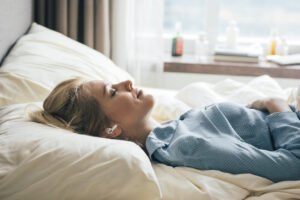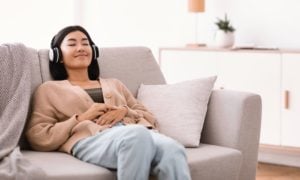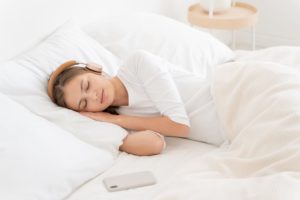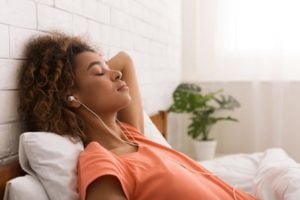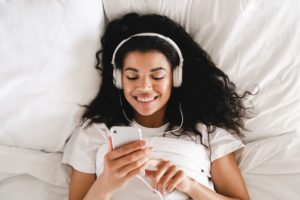How Noise Can Affect Your Sleep Satisfaction
Noise has a major impact on sleep. Exposure to too much noise during sleep has immediate effects while we are sleeping, which leads to short-term issues the next day, and over time may result in long-term mental and physical consequences.
Effects of Noise During Sleep
Noises at night might wake you up, and a fragmented night’s sleep is less refreshing. Even noises that don’t wake you up have subconscious effects on sleep by changing the time we spend in certain sleep stages. Sleep stages are the different types of sleep we cycle through each night, ranging from lighter stages (1 and 2) to deep (slow wave) sleep and rapid eye movement (REM). Environmental noise, such as air and vehicle traffic, has been shown to increase stage 1 sleep and decrease slow wave and REM sleep.
Nighttime noise may also cause extra production of hormones such as adrenaline and cortisol as well as elevated heart rate and blood pressure.
A study of circadian rhythms in mice showed an increased sensitivity to noise trauma at night compared to during the day, and the researchers hypothesize this sensitivity may apply to human circadian rhythm as well.

Short-Term Effects of Noise
Getting sufficient undisturbed sleep is critical for feeling good and performing well. Although you are unlikely to notice subtle changes to your sleep structure and biochemical experience of sleep, these changes can manifest the next day in ways that are more pronounced. Sleepiness, irritability, and poorer mental health are associated with exposure to nighttime noise the night before.
Long-Term Effects of Noise
Poor quality sleep over a long period of time is linked with high blood pressure, heart disease, weight gain, type 2 diabetes, and certain types of cancer. The relationship between noise during sleep and long-term health effects is less clear, but studies indicate a possible association with high blood pressure , heart disease and stroke , increased use of sleep medications , and decreased overall health.
“A quiet space is an essential component of an environment that is conducive to sleep. I always try to get a detailed description of my patient’s sleep environment so we can identify any factors that might be creating disruptive noise.”
Dr. David Rosen, Sleep Medicine Physician
Is It Better to Sleep in Silence or With Noise?
In a perfect world, we would all have the option to retreat to a completely soundproof bedroom. However, noise exposure is a nightly reality for most.
You might be able to limit sound exposure in your bedroom at night by following the steps outlined above, but if that’s not enough, adding a consistent background noise may mask or drown out the sounds you can’t control and could help to counteract the harmful effects of noise exposure during sleep. Also, some people find that background noise helps to distract them from anxious or intrusive thoughts and prepares the mind for sleep.
Research studies have produced conflicting data about whether adding a stream of background noise improves sleep quality. One study of the effects of adding sound from an air conditioner in the home found no positive impact on sleep. In another experiment, researchers investigated the effect of broadcasting white noise into the rooms of hospitalized patients and found that white noise improved sleep quality over the course of three nights compared to a control group. A third study of patients who were having trouble sleeping showed that white noise helped them fall asleep 38% more quickly . Given the inconsistent data, the utility of adding background noise may come down to personal preference.
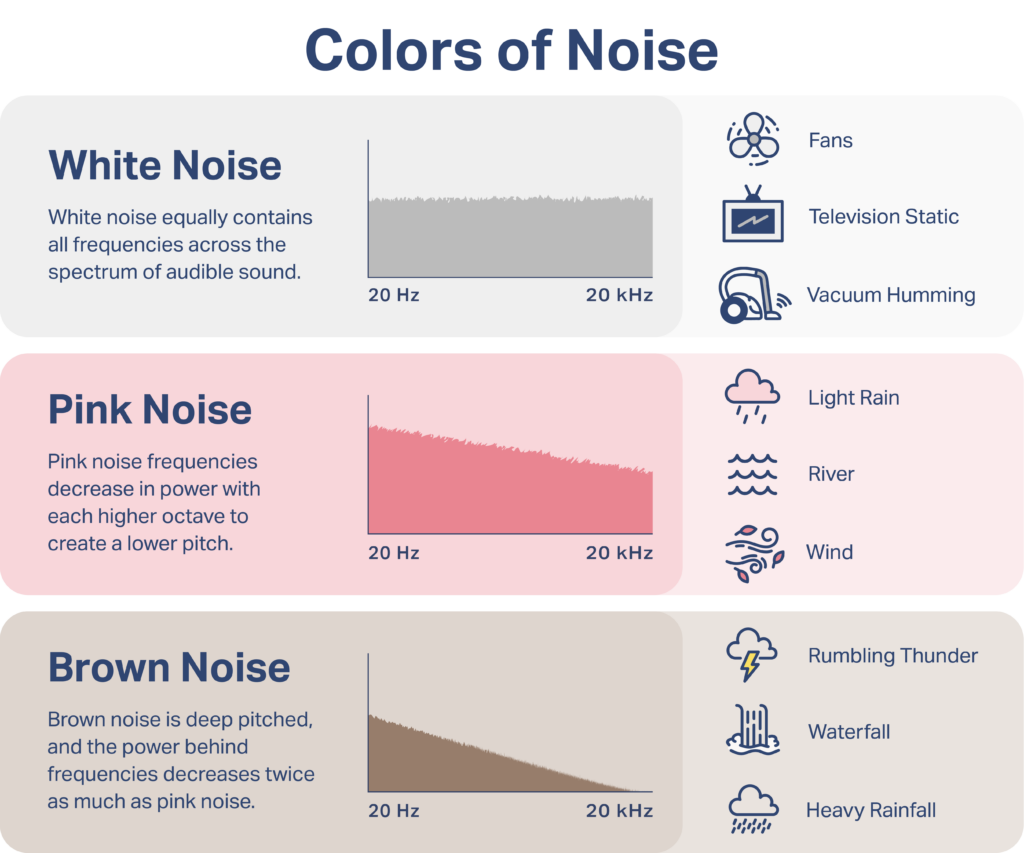
What Are the Best Sounds to Sleep To?
The best night sounds for sleeping can vary from one person to the next, but consider utilizing sounds that are loud enough to cover other noises and that maintain an even tone and volume; sudden sound changes could cause you to wake up. It might help to experiment with a few and see what works for you. Here are some ideas to get you started:
- White noise: White noise is produced by layering multiple sound frequencies at the same time. One option is to invest in a white noise machine; you could also look into downloading a white noise app or sound file to your smartphone or tablet. If white noise sounds too harsh, then you may prefer pink noise instead. Pink noise combines louder high-frequency noise with softer low-frequency noise, resulting in a sound that is more even and less layered.
- Turn on a fan or air conditioner: These devices produce consistent ambient noise that may help to drown out intrusive environmental sounds.
- Music: The songs that are soothing and sleep-inducing depend on one’s own musical taste and personal experience with music. You might try creating a playlist of songs that are relaxing to you or searching for curated sleep playlists provided by streaming services.
- Sounds from nature: Hearing rain, ocean waves, wind, and other natural sounds helps some people fall asleep. Certain sleep sound machines come programmed with a selection of sounds to choose from, or you can search for apps or sound files to download onto your device. A variety of sleep sounds can also be found on our YouTube channel.
How To Avoid Noises When Trying to Sleep
In a city, it’s common to deal with the sounds of traffic, sirens, airplanes, or people gathering outside. Even in suburban or rural settings you are unlikely to be completely isolated from noisy appliances, cars, neighbors, and animals during the night. Additionally, other people or pets in your home may make noise that disrupts your sleep. Think about the specific sounds that affect your living space as you review the following ideas for avoiding noise at night.
Adjust Your Bedroom Environment
Creating a bedroom space that’s as supportive of a quiet night’s sleep as possible is a critical part of good sleep hygiene.
- Add soft surfaces: Sound reverberates off of hard surfaces and is absorbed by soft ones. Adding rugs, cushioned furniture, or thick curtains to your bedroom might help block or lessen noise both coming in from the street and from within your house.
- Insulate windows: If loud noises are infiltrating your bedroom from the outside, options include installing soundproof windows as well as sealing any air gaps in the windows you have.
- Reduce appliance noise: If your refrigerator or air conditioner is emitting abnormal sounds, have it repaired. When the time comes to replace an appliance, shop for one that is quiet.
- Turn off alerts: Make sure you have your electronic devices on silent mode so that notifications don’t wake you up at night.
“For those struggling with a noisy sleep environment, be prepared for some trial and error. For example, you might find ear plugs to be helpful at first, but over time you may find you prefer the noise of a fan. Go into this with an open mind and you can find the right solution, because you deserve a restful and quiet sleep environment.”
Dr. David Rosen, Sleep Medicine Physician
Plug Your Ears
Depending on your living situation, you may not be able to physically soundproof your bedroom. Ear plugs are an effective tool as long as they don’t interfere with your ability to sleep. A research study found that hospital patients who wore earplugs and an eye mask woke up less often and experienced more deep sleep compared to a group of patients who did not.
An alternative to earplugs is to find small, comfortable noise-cancelling headphones, which are designed to block out noise and also allow you to introduce relaxing sounds that could help you sleep.
Negotiate With Others
If your primary source of noise at night is coming from other people in your home, communicate with them about how they can help you get the sleep you need and how you can return the favor. When operating on different sleep schedules, some noise at night is inevitable, but you could try agreeing upon rules for quiet hours. For example, it might help to request that your partner or roommate use headphones to listen to TV or music while you are sleeping. Planning ahead by cooking meals and laying out the next day’s clothes during waking hours can also cut down on disruption.
If your partner’s snoring is keeping you up, talk with them about it. Lifestyle changes or anti-snoring mouthpieces might help. Very loud snoring and choking or gasping sounds at night could be signs of obstructive sleep apnea. Seek a doctor’s help if you notice these symptoms in your partner.

Still have questions? Ask our community!
Join our Sleep Care Community — a trusted hub of sleep health professionals, product specialists, and people just like you. Whether you need expert sleep advice for your insomnia or you’re searching for the perfect mattress, we’ve got you covered. Get personalized guidance from the experts who know sleep best.
References
12 Sources
-
Basner, M., Müller, U., & Elmenhorst, E. M. (2011). Single and combined effects of air, road, and rail traffic noise on sleep and recuperation. Sleep, 34(1), 11–23.
https://pubmed.ncbi.nlm.nih.gov/21203365/ -
Basner, M., Clark, C., Hansell, A., Hileman, J. I., Janssen, S., Shepherd, K., & Sparrow, V. (2017). Aviation Noise Impacts: State of the Science. Noise & health, 19(87), 41–50.
https://pubmed.ncbi.nlm.nih.gov/29192612/ -
Gonze, D., & Goldbeter, A. (2006). Circadian rhythms and molecular noise. Chaos (Woodbury, N.Y.), 16(2), 026110.
http://aip.scitation.org/doi/10.1063/1.2211767 -
Halperin D. (2014). Environmental noise and sleep disturbances: A threat to health?. Sleep science, 7(4), 209–212.
https://pubmed.ncbi.nlm.nih.gov/26483931/ -
Medic, G., Wille, M., & Hemels, M. E. (2017). Short- and long-term health consequences of sleep disruption. Nature and science of sleep, 9, 151–161
https://pubmed.ncbi.nlm.nih.gov/28579842/ -
Jarup, L., Babisch, W., Houthuijs, D., Pershagen, G., Katsouyanni, K., Cadum, E., Dudley, M. L., Savigny, P., Seiffert, I., Swart, W., Breugelmans, O., Bluhm, G., Selander, J., Haralabidis, A., Dimakopoulou, K., Sourtzi, P., Velonakis, M., Vigna-Taglianti, F., & HYENA study team (2008). Hypertension and exposure to noise near airports: the HYENA study. Environmental health perspectives, 116(3), 329–333.
https://pubmed.ncbi.nlm.nih.gov/18335099/ -
Floud, S., Blangiardo, M., Clark, C., de Hoogh, K., Babisch, W., Houthuijs, D., Swart, W., Pershagen, G., Katsouyanni, K., Velonakis, M., Vigna-Taglianti, F., Cadum, E., & Hansell, A. L. (2013). Exposure to aircraft and road traffic noise and associations with heart disease and stroke in six European countries: a cross-sectional study. Environmental health : a global access science source, 12, 89.
https://pubmed.ncbi.nlm.nih.gov/24131577/ -
Franssen, E. A., van Wiechen, C. M., Nagelkerke, N. J., & Lebret, E. (2004). Aircraft noise around a large international airport and its impact on general health and medication use. Occupational and environmental medicine, 61(5), 405–413.
https://pubmed.ncbi.nlm.nih.gov/15090660/ -
Alkahtani, M. N., Alshathri, N. A., Aldraiweesh, N. A., Aljurf, L. M., Aldaej, L., Olaish, A. H., Nashwan, S. Z., Almeneessier, A. S., & BaHammam, A. S. (2019). The effect of air conditioner sound on sleep latency, duration, and efficiency in young adults. Annals of thoracic medicine, 14(1), 69–74.
https://pubmed.ncbi.nlm.nih.gov/30745938/ -
Farokhnezhad Afshar, P., Bahramnezhad, F., Asgari, P., & Shiri, M. (2016). Effect of White Noise on Sleep in Patients Admitted to a Coronary Care. Journal of caring sciences, 5(2), 103–109.
https://pubmed.ncbi.nlm.nih.gov/27354974/ -
Messineo, L., Taranto-Montemurro, L., Sands, S. A., Oliveira Marques, M. D., Azabarzin, A., & Wellman, D. A. (2017). Broadband Sound Administration Improves Sleep Onset Latency in Healthy Subjects in a Model of Transient Insomnia. Frontiers in Neurology, 8, 1.
https://pubmed.ncbi.nlm.nih.gov/30670235/ -
Demoule, A., Carreira, S., Lavault, S., Pallanca, O., Morawiec, E., Mayaux, J., Arnulf, I., & Similowski, T. (2017). Impact of earplugs and eye mask on sleep in critically ill patients: a prospective randomized study. Critical care (London, England), 21(1), 284.
https://pubmed.ncbi.nlm.nih.gov/29157258/


